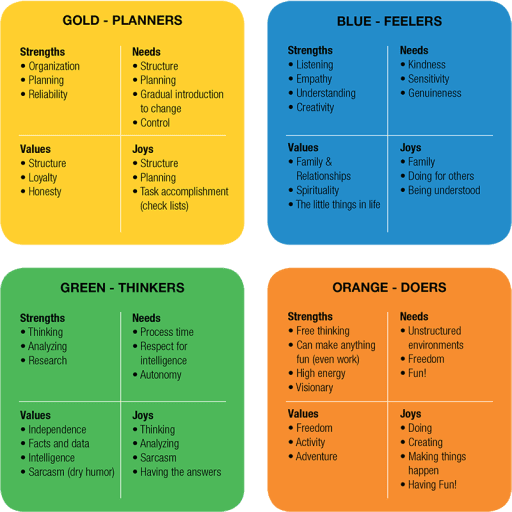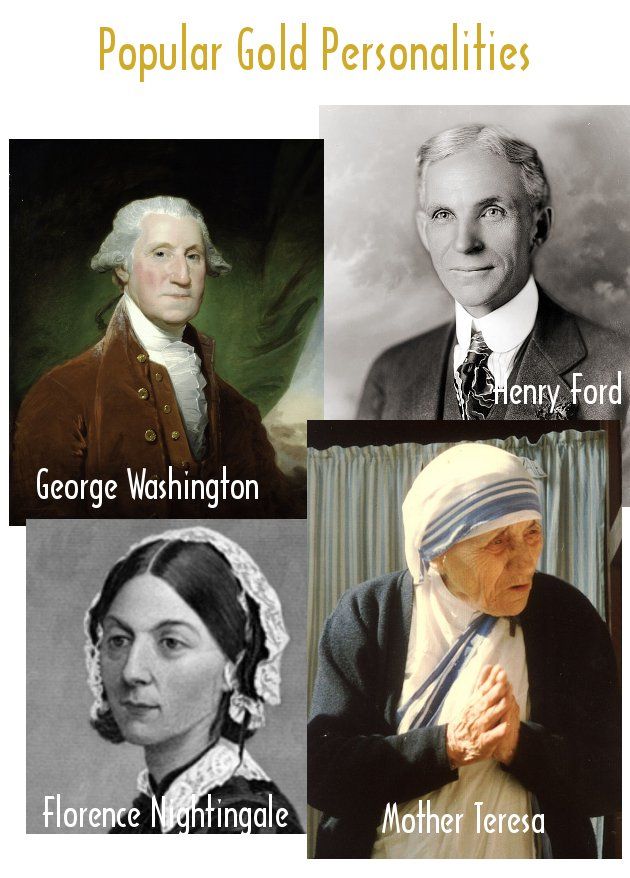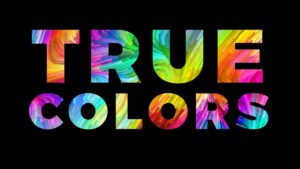What is the Gold True Colors Personality Type?
The Gold True Colors Personality Type is known as the Structure-Oriented Personality Style.

- They need to be helpful and belong and are a natural preserver.
- The Gold type values home, family, and tradition and strongly understand right and wrong in life.
- They need to follow the rules and respect authority.
- Golds are loyal, dependable, and prepared.
- They are caring, concerned, and concrete.
People might describe you as opinionated, stubborn, or judgmental if you received a primarily gold result.
If you see others acting disagreeing, you might feel irritated or want to change their behaviors.
You may feel rooted in your values and integrity. You could take pride in being organized, punctual, and dependable.
Golds are often detail-oriented and might not shy away from challenging or long-term work.
They may often work long hours or put all their energy into work. Working toward a clear goal may make one feel most comfortable for a gold.
They may enjoy working as a pharmacist, accountant, business executive, or court reporter.
Golds often desire structure in their lives. Their need for order may leave them feeling stressed and anxious when things do not go as planned.
As a gold, you might value family, tradition, and creating a legacy for yourself.
Gold Personality Type cross-reference
- Keirsey Type – Guardian
- Temperament Type – Melancholy
- Animal Type – Beaver
- DISC Type – Compliant
- Socio-Communicative Type – Analytical
- Color Code – White
- Personality Compass – East
- Occupational Type – Realistic
MBTI Personality Types (xSxJ) – Sensing and Judging
Enneagram Types
- Type 1 – The Reformer (All Judging)
- Type 2 – The Helper (ESFJ, ISFJ)
- Type 6 – The Loyalist (All Sensing)
- Type 8 – The Challenger (ESTJ)
Gold Personality Type Careers
What are the True Color Personality Types?
Don Lowry developed the True Colors Four Personality Temperaments model in 1978 based on the Keirsey Temperament Sorter, which adapts the 16 Myers-Briggs Personality Types (MBTI) into Four Personality Temperaments.

However, Lowery, a student of David Kiersey, focused more on core motivation, intrinsic values, and communication styles among individuals in the workplace, family, school, and other social gatherings.
Each True Color, Gold, Blue, Green, and Orange, is associated with certain Personality Traits or behaviors and correlates with the four Keirsey MBTI Temperaments.
Lowery proposed that your True Colors is a developmental process that can be observed throughout an individual’s life.
The order and our first Colors are developed during the early phases of our lives, between six and twelve years of age. Our second Color is developing between twelve and twenty to support your first. Then, our third and fourth Colors are created later in our lives.
Personality Temperaments, Traits, and Types
Personality Temperaments, Traits, and Types are used in psychology to discuss a person’s Personality. Although often used interchangeably, the differences are worth understanding.
Personality is a collection of Emotions, Perceptions, and Actions that interact with each other and regulate themselves, shaping a dynamic system that forms a person’s “Behavioral Patterns.”
Many factors affect a person’s Personality, such as education, socialization, and other various pressures and aspects of life.
Personality Traits are observable characteristic patterns of Thoughts, Feelings, and Behaviors that are consistent and stable over time and across different situations throughout your life. Three criteria characterize Personality Traits: (1) consistency, (2) stability, and (3) individual differences.
For example, if you are talkative at home, you are also talkative at work. And if you were talkative as a child, you are still talkative as an adult.
Personality Temperaments are biological Traits that are partly inherited through your genes and partially determined by your brainstem. They don’t change throughout your life.
These “Natural Traits” are regarded as innate, inborn, and not learned. Your Personality Temperament is formed as an infant and never changes. It is also hard to modify, manipulate, or change because it is genetic. In some way or another, your inherited behavioral tendency will always be there.
A Personality Type identifies a specific collection of Traits, both learned and natural, comprising a broad, general classification. Personality Types involve qualitative differences between people, whereas Personality Traits are the quantitative differences between people.
The most crucial difference between Trait Theory and Type Theory is that Type Theory views people’s characteristics as discrete categories, while Trait Theory views these characteristics as a continuum.
For example, while a Type Theorist would claim that introverts and extraverts are two types of people, a Trait Theorist claims that extraversion is a gradient, and individuals can fall somewhere in the middle.
Your Temperaments and acquired Traits form your Personality, which can be Typed.
Gold Characteristics
- Prepared.
- Likes a structured environment.
- Well-organized.
- Follows through.
- Detail-oriented.
- Loves to plan.
- Punctual.
- Procedural.
- Follows the rules.
- Values tradition.
- Frugal.
- Generosity.
- A parental nature.
- A sense of history.
- They are perpetuating heritage.
- A value of the order.
- Home and family.
Gold Types Feel Duty is Strength
They value order and cherish home and family traditions if your brightest Color is Gold.
- They provide for and support the structure of society.
- Steadfastness and loyalty are your trademarks.
- Generous and parental, you show you care by making everyone do the right thing.
- To disregard responsibility never occurs to you.
Gold Types Need to be Responsible
People in this group are in esteem when they feel responsible and when they belong to an organized group.
However, regardless of the social unit, they must earn their place by being helpful, fulfilling responsibilities, being of service, and caring for others.
- They value order. They cherish the traditions of home and family.
- Loyalty and steadfastness are their trademarks.
- They are generous and parental, demonstrating that they care by ensuring everyone does the right thing.
- Rules by which people interact are of utmost concern to them.
- The security of the family unit and all that it stands for is the foundation upon which all other interactions are expressed, be it in school, workplace, union, or society.
Gold Types Finds Comfort in Structure
Examples of the Gold structure are edified early in life.
Participation in youth organizations is the groundwork for Golds’ future comfort zones, and as adults, they are drawn to service organizations.
Titles, banners, flags, and similar forms of organizational identity are necessary symbols representing the physical stamps of approval for their behavior.
Gold Types Want Responsibility
To a Gold personality, responsibility is a blessing.
Even if “dumped upon,” the Gold cannot be dissuaded from the continuing and enjoyable quest for responsibility and duty.
Gold Types Provide Standards to Society
People in the Gold group have a distinct concern for others, but it differs from that of a Blue personality.
The mission of the Gold is to provide standards within society to enable people to tend to obligations better.
The financial world is the domain of the Gold, and they are drawn to education, medicine, and service.
The Gold Type Self-esteem
The self-esteem of the Gold personality flows from stability, which represents their primary motivation and direction.
They receive self-esteem from society and as part of the organization—almost personifying the organization as they exemplify what the organization strives to accomplish.
Gold Type on a bad day
- Complain.
- Wallow in Self-Pity.
- Worry.
- Complain of Psychosomatic Problems.
- Make Malicious Judgments About Yourself/Others.
- Unthinkingly Follow the Letter of the Law.
- Because Overly Authoritative.
- Become Unreasonably Fixed.
- Be Unforgiving.
- They feel a lot of Anxiety/Pressure.
- Become Overly Tired/Depressed.
Gold Type Stressors
- Lack of follow-through.
- They are not adhering to schedules or plans.
- Change.
- Unclear expectations.
- They don’t know where they fit, not belong.
- Lack of consistency, leadership, and master plan.
- They are forced to neglect family time or traditions.
- Missing deadlines.
- Rule-breakers.
- Incomplete Tasks.
- Ambiguous Answers.
- Many Things are Going on at Once.
- The irresponsibility of Others.
- A Haphazard Attitude.
Gold Type Frustrations
Things that Frustrate You…
- Irresponsibility.
- Lack of Planning.
- Lack of Discipline.
- Laziness.
- High Risk-Taking.
- Illegal Behavior.
Things You Do That Frustrate Others…
- Control Freak.
- Being Bossy and Controlling.
- Working Long Hours.
- Being Obnoxious.
- Being Judgmental.
- Planning for Everything.
Gold Relationships
- They are serious and tend to have traditional, conservative views of love and marriage.
- They want a mate to work with them, building a secure, predictable life together.
- They demonstrate love and affection through the practical things they do for your loved ones.
Gold Childhood
- They wanted to follow the rules and regulations of the school.
- They understood and respected authority and were comfortable with the academic routine.
- They were the easiest of all children to adapt to the educational system.
Gold Communication Styles
When the Gold Type is Communicating with others
- Be patient when others talk in different directions.
- Be open-minded and consider other options.
- Be aware of how hard you drive yourself and others; ease up.
- Accept others’ way of doing things if the ultimate goal is the same.
When Communicating with Gold Type
- Communicate in writing.
- Don’t interrupt.
- Be specific.
- Closure.
- Stay on target (task, topic, and time).
- Be consistent.
Gold Perception
How the Gold Type perceive themselves
- Stable.
- Providing Security.
- Always Have a View.
- Good at Sorting/Weeding Out.
- Decisive.
- Executive Style.
- Organized.
- Goal-Oriented.
- Dependable.
- Firm.
- Efficient.
- Good Planner.
- Orderly.
- Neat.
- Punctual.
- Seeks Closure.
- They know what’s best.
- Responsible.
How Others Perceive the Gold Type
- Rigid.
- Dull.
- Boring.
- Opinionated.
- Unimaginative.
- Bossy.
- Predictable.
- Controlling.
- Stubborn.
- System-Bound.
- Judgmental.
- Uptight.
- Autocratic.
- Stubborn.
- Workaholic.
- It’s rigid about time.
Gold Work Traits
Gold employees perform best when their duties are structured and clearly defined:
- Abstract ideas and concepts are secondary to you until the foundations are presented.
- They always want to know when you are on the right track.
- They feel that rules and direction are required.
- They think others should share in the responsibilities and duties at work.
- They provide stability and can maintain organization.
- Their ability to handle details and to work hard makes them the backbone of many organizations.
- They believe that work comes before play, even if you must work overtime to complete the job.
- They are accountable and thorough and dedicate time and energy to maintaining your organization.
- They naturally provide stability and bring punctuality, order, and clarity of rules and regulations.
- They like to be helpful and see it as their responsibility to ensure everyone understands how to do things.
- They value respectful behavior from managers and co-workers.
- People around them sense being in a safe and secure environment.
- Their office is organized, and your routines are well structured.
- They are dependable and consistent.
- They believe that good employees are the building blocks of the future, and you feel responsible for training them.
- They delegate the duties of your job to reward and foster responsibility.
- They organize and structure learning in a step-by-step fashion.
- Their concept of success emphasizes responsibility, belonging, conformity, trust, organizational faith, family, and home.
Gold Type Leadership Style
- Expect punctuality, order, and loyalty.
- Assumes the “right” way to do things.
- Seldom questions tradition.
- Rules oriented.
- Detailed/thorough approach— threatened by change.
- Prolonged time to initiate any change.
- Expect people to “play” their roles.
How the Gold Type like to receive praise
- When they were honest and explicitly mentioned what was accomplished.
- When their thoroughness and sense of responsibility are recognized.
- When their cleverness and skills are recognized.
- When they’re recognized as an integral part of the group.


